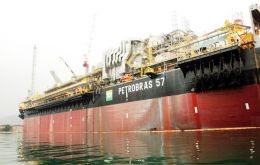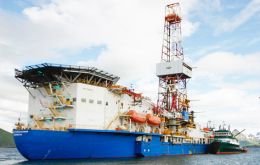MercoPress. South Atlantic News Agency
Energy & Oil
-
Tuesday, February 17th 2015 - 05:40 UTC
Peru asks Argentine oil company to leave conflict zone while it reassesses contract

Peru will evaluate a natural gas contract it signed with Pluspetrol in 2005 and is asking the Argentine company to leave a restive Amazonian town following deadly protests, the government said on Thursday. Pluspetrol started exploratory activities in natural gas block 108 last year, upsetting locals in the town of Pichanaki who fear it will lead to pollution and hurt farming.
-
Tuesday, February 17th 2015 - 05:09 UTC
Rolls-Royce allegedly caught in the Petrobras bribery scandal

Rolls-Royce has said it does not “tolerate improper business” after the Financial Times reported that the firm had been accused of being caught up in a bribery scandal in Brazil. Ft reported allegations that the company paid bribes for a contract with Brazilian oil firm Petrobras.
-
Monday, February 16th 2015 - 21:50 UTC
Falklands begins consultation on oil impact on society and local culture

Falkland Islands will this month begin to grapple with the big questions about how oil and gas development will impact on their society and culture. The start of a series of focus groups run as part of the Social Effects Monitoring Programme study, led by Regeneris Consulting, and Falkland Island partners Karen Lee and Carolyn Montgomerie, reports the Penguin News in its latest edition.
-
Thursday, February 12th 2015 - 05:55 UTC
Petrobras CEO says he has 'full autonomy' in fuel-price policy and cash flow

The new chief executive officer of Brazil's Petrobras said that he has full autonomy to dictate its own fuel-pricing policy and protect cash, even as he questioned the size of losses stemming from a giant corruption scandal.
-
Thursday, February 12th 2015 - 05:45 UTC
Petrobras has trouble finding an independent chairman of the board

Petrobras plans to publish its delayed audited fourth-quarter results by the end of March, something it needs to do to avoid possible early repayment of its bonds, the Globo newspaper said on Wednesday. Globo also published that the Brazilian government was considering appointing Planning minister Nelson Barbosa as chairman of the oil giant.
-
Thursday, February 12th 2015 - 05:23 UTC
Explosion in Petrobras floating oil rig kills at least three; six missing

At least three oil workers were killed and others were injured in an explosion at an offshore oil and natural gas platform in Brazil operated by state-run energy company Petroleo Brasileiro SA , union officials have said.
-
Wednesday, February 11th 2015 - 15:31 UTC
Arctic oil on life support

Oil companies have eyed the Arctic for years. With an estimated 90 billion barrels of oil lying north of the Arctic Circle, the circumpolar north is arguably the last corner of the globe that is still almost entirely unexplored.
-
Wednesday, February 11th 2015 - 15:26 UTC
Norway's Statoil appoints new CEO and identifies three main challenges

Statoil’s board of directors has appointed Eldar Sætre as the company’s new president and CEO. Sætre, who has 35 years’ experience from Norway's' Statoil and the oil and gas industry, has been acting as president and CEO since October, and assumes the role with immediate effect.
-
Friday, February 6th 2015 - 23:27 UTC
Market reacts negatively to Petrobras new CEO: too political and too close to Rousseff

Shares in Brazil's oil giant Petrobras plunged Friday as banking executive Aldemir Bendine, who is seen as too close to President Dilma Rousseff's party, was named the scandal-hit firm's new chief executive.
-
Friday, February 6th 2015 - 17:38 UTC
Falklands offered oil industry scholarships from Trinidad

Three scholarships for Falkland Islanders at the National Energy Skills Centre (NESC) in Trinidad and related to the oil and gas industry are likely to be available within two years and will be overseen by the Training Centre in the Falklands.
